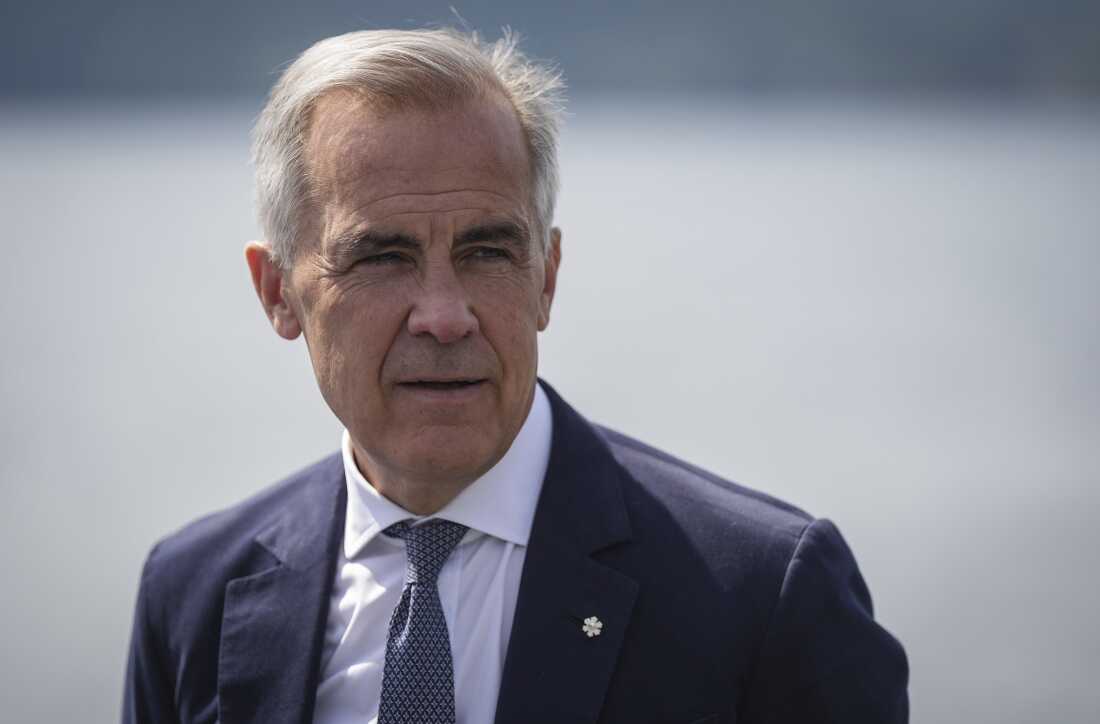Canada’s Prime Minister Mark Carney listens whereas touring the Royal Canadian Navy torpedo restoration vessel Sikanni on the Canadian Forces Maritime Experimental and Take a look at Ranges, in Nanoose Bay, British Columbia, Aug. 4.
Darryl Dyck/The Canadian Press through AP
disguise caption
toggle caption
Darryl Dyck/The Canadian Press through AP
TORONTO — Canada is dropping retaliatory tariffs to match U.S. tariff exemptions for items coated beneath the United States-Mexico-Canada commerce pact, Prime Minister Mark Carney introduced Friday.
Carney stated Canada will embrace the carve-out that the U.S. has on Canadian items beneath the 2020 free commerce deal that shields the overwhelming majority of products from the punishing duties.
“Canada currently has the best trade deal with the United States. And while it’s different from what we had before, it’s still better than that of any other country,” Carney stated.
Carney and U.S. President Donald Trump spoke on the telephone Thursday and Carney met along with his Cupboard on Friday earlier than making the announcement.
The transfer is designed to reset commerce talks between the 2 nations. The USMCA is up for evaluation in 2026, and Carney referred to as the commerce pact a novel benefit for Canada at a time when it’s clear that the U.S. is charging for entry to its market.
Carney stated the dedication of the U.S. to the core of USMCA means the U.S. common tariff price on Canadian items stays considered one of its lowest, and that over 85% of Canada-U.S. commerce continues to be freed from tariffs.
Canadian and Mexican firms can declare preferential therapy beneath the USMCA.
Former Prime Minister Justin Trudeau initially placed on retaliatory tariffs in response to U.S. tariffs, however earlier than the U.S. tariffs had been utilized the Trump administration exempted items coated by the free commerce deal.
Most imports from Canada and Mexico are nonetheless protected by the USMCA, however U.S. Commerce Secretary Howard Lutnick has stated, “I think the president is absolutely going to renegotiate USMCA.”
Preserving the free commerce pact can be important for Canada and Mexico. Greater than 75% of Canada’s exports go to the U.S. whereas greater than 80% of Mexico’s exports go there.
Trump has introduced some sector specific-tariffs that do apply for Canada regardless of the USMCA — generally known as 232 tariffs — that are having an impression on the Canadian economic system. There’s a 50% tariff on metal and aluminum imports, for instance.
“Canada and the United States have reestablished free trade for the vast majority of our goods. Canada will retain our tariffs on steel, aluminum and autos as we work intensivily to resolve the issues there,” Carney stated.
Carney beforehand rescinded Canada’s plan to tax U.S. know-how corporations after Trump stated he was suspending commerce talks with Canada over these plans, which he referred to as “a direct and blatant attack on our country.”
The prime minister disputed any notion that Canada is appeasing Trump, noting that Canada is matching what the U.S. is doing.
“The president and I had a long conversation,” Carney stated. “There is a review of the free trade agreement in the spring. We’re starting our preparations.”
Lana Payne, president of Unifor, Canada’s largest personal sector union, characterised Carney’s announcement as Canada backing down, and stated the nation should not again down except the U.S. drops all punitive tariffs.
“Trump’s attacks on auto, steel, aluminum, and forestry sectors are hurting Canadian workers in real time,” she posted on social media. “Walking back counter-tariffs isn’t an olive branch. It only enables more U.S. aggression.”












